For over six months, the Student Council failed at coming to an agreement on a rise in student fees. Only a few weeks prior to the University Elections did they start having more intense conversations surrounding the issue — while almost forgetting to include the Student Faculty Councils. But what exactly was at risk for our SFCs?
Our university with its nine faculties is divided in 16 student faculties, which are represented by just as many Student Faculty Councils (SFCs). Apart from paying for the student services and the D‑Semesterticket — which make up the lion’s share of the semester fees — the SFCs too get their funding from the student body membership dues, which is also included in the semester fee students pay in order stay enrolled. Since the last increase in the winter term 2018/19, SFCs get €2.75 per student belonging to their respective student faculty. The smallest Student Faculty Council is the SFC Theology with only around 160 students, while the biggest — the SFC Philosophical Faculty I (Phil. Fac. I) — counts upwards of 2,300. This discrepancy in numbers of students per SFC leads to stark differences in the size of the available yearly budget. As a result, larger SFCs have more budget available for projects, like organizing parties, game nights, lectures, etc.
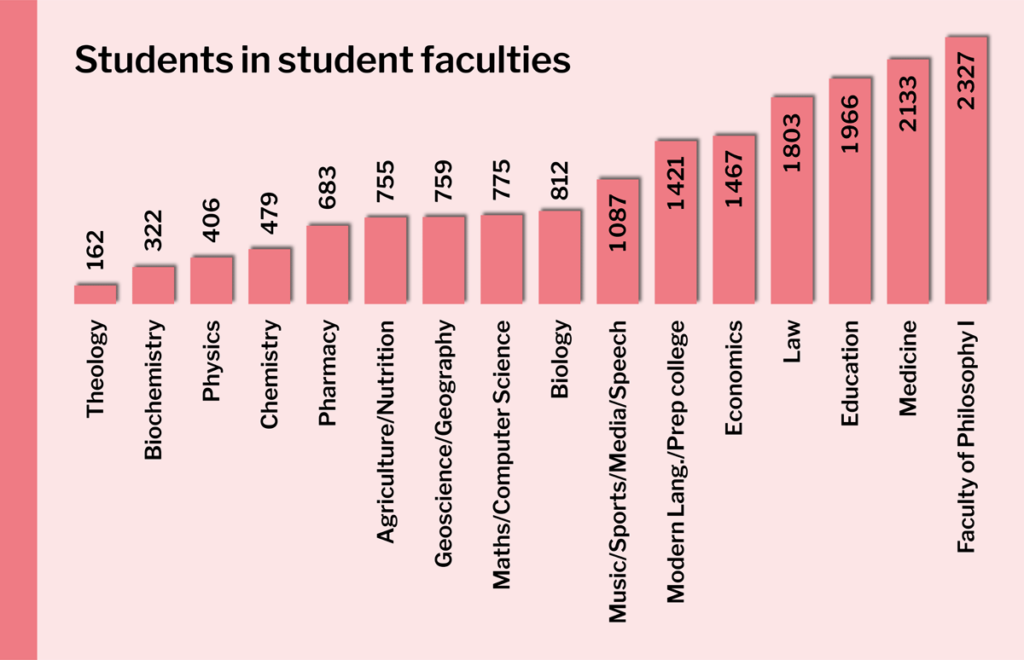
Regarding the Financial Situation
Naturally, the inflation does not stop just short of the Student Faculty Councils. Many of the larger ones replied to an inquiry of the hastuzeit that while they are currently still able to get by with the financial means available, the monetary situation is becoming strained. The SFC Economics wrote back that they partly have become dependent on income generated by events. Some student faculty councils, like Chemistry and Law, are reporting that they were able to use financial reserves from Covid times to balance the fiscal needs of the past years.
Some Student Faculty Councils are drawing on Covid reserves
“We, like every other smaller SFC, are currently finding ourselves in a rather bad situation,” writes the SFC Maths/Computer Science. The theologists are finding themselves to be financially limited as well. The SFC Biochemistry on the other hand also emphasizes the impact of capacity. A large budget cannot replace committed people and helping hands — although it does open up more options. The Student Faculty Councils of Education, as well as Agricultural and Nutritional Sciences seem to be the outliers here, as they report to be coping well in their current financial situation.
A Rather Opaque Debate
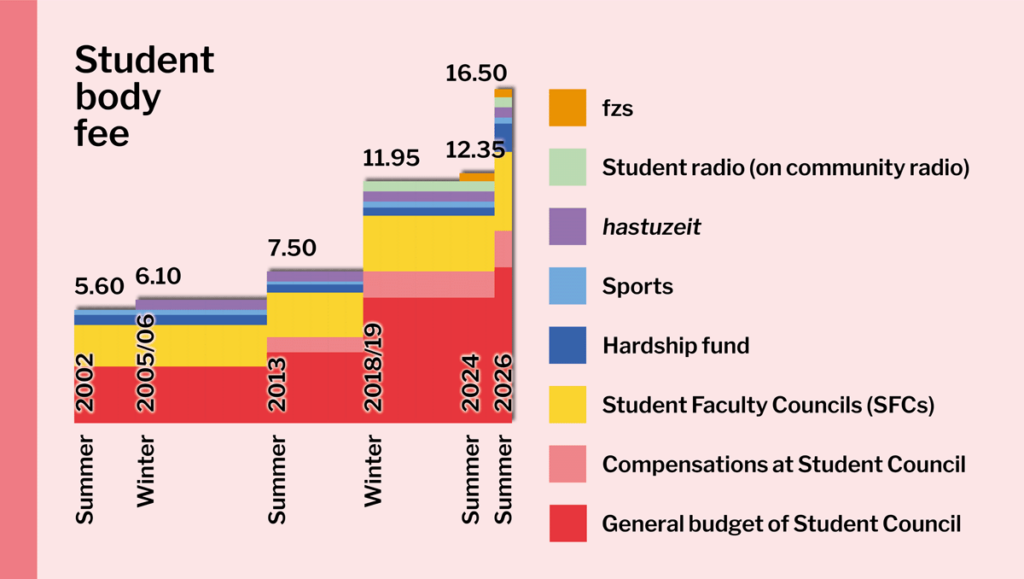
In 2002, the membership fee was just under €6. This changed in 2005, when it increased by €0.50 to fund the hastuzeit. In 2013, the fee was increased for the first time, with the SFCs now getting €2.20 per student instead of €2.05, while the Student Council started paying compensations. Five years later came the next increase. Compensation increased proportionately from €0.75 to €1.30, while simultaneously the Student Council’s general budget almost doubled, going from €3.50 to €6.20. The last change in membership fees took place in 2024, as for the full membership in the fzs (“Free Alliance of Student Bodies”) every student now had to pay an additional €0.40.
This summer semester the student fee debate started to emerge more and more. Many Student Faculty Councils criticized the Student Council for a lack of transparency regarding the topic and the debate surrounding it. “We only heard of the debate even taking place through our SFC members who were also in the Student Council, other SFCs had no idea that this was happening at all,” reports the SFC Law. Completely out of the loop, for example, was the SFC Biochemistry. Additionally, the SFC Medicine accuses: “The first concepts completely disregarded the SFCs […]”.
The SFC Phil. Fac. I as well as SFC Biochemistry are of the opinion that this debate should have taken place much earlier in the current legislative term. If a change in student fees is agreed upon, it then needs to be announced in the university’s official gazette before it can take effect. In addition to this process, one needs to also keep track of the re-registration period, which also confines everything to a strict time frame. Originally, the debate was first mentioned this last November, back when the Student Council was discussing this year’s financial budget, but was left to simmer on the back burner of student politics without any course of action. Now, a fee increase can at the earliest happen for the summer semester 2026, although the priorities of the Student Council seem to have stayed questionable. “They focused on projects like the Law faculty’s ball, which got over €1,500 in financial means”, instead of “tending to the issue of financing the Student Council and getting a two-thirds majority,” writes the SFC Biochemistry in their reply.
Out of the loop on the fee debate for quite some time
Demands and Consequences
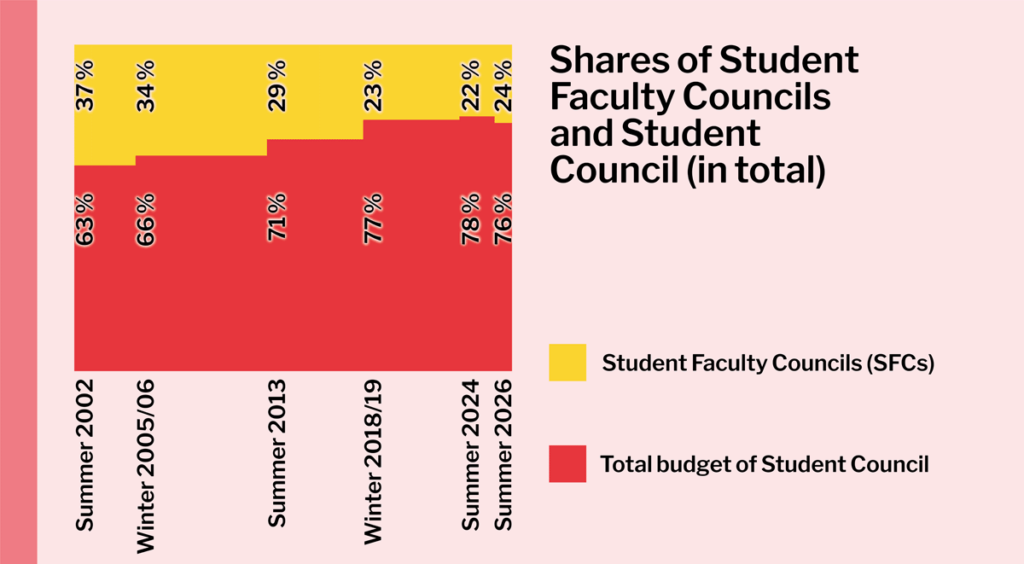
While the funds allocated for the SFCs shrunk in comparison to the Student Council within the last years, …
Opinions surrounding the finances differ greatly between the Student Faculty Councils. In the debate around the increase of student fees, the SFC Medicine are especially critical of the compensation: “If the SFCs would implement those in the same manner, our entire current budget would be used up by it.” The Chemists agree: “It cannot be the case that circa €300,000 are used to pay staff and compensation, while the budget for the entirety of the SFCs is only about half of that.” To be precise, in the 2025 budget circa €140,000 are for the Student Faculty Councils and €250,000 are to be used for staff (€180,000) and compensation (€70,000). In this case, one must also take into account the difference in workload. The duties of the spokespeople in the Student Council are difficult to compare to those in the Student Faculty Councils, both in nature and scope. The same goes for the employees.
Opinions differ on the Student Council’s compensations
On the other hand, the SFC Chemistry also criticizes: “You can’t pay the student council’s SFC coordinator €75 a month for organizing three meetings a year, while the members of the SFCs work free of charge.” They also demand that “before we talk about an increase in student membership fees, we should revise the structures of the Student Council, in order to stop the enrichment of a few at the expense of many.” The chemists take issue with the fact that, in their opinion, many funded projects would only reach a small number of students. This criticism mainly includes the existence of the AK Protest, AK Wohnzimmer, but also the “Free Alliance of Student Bodies” (fzs).
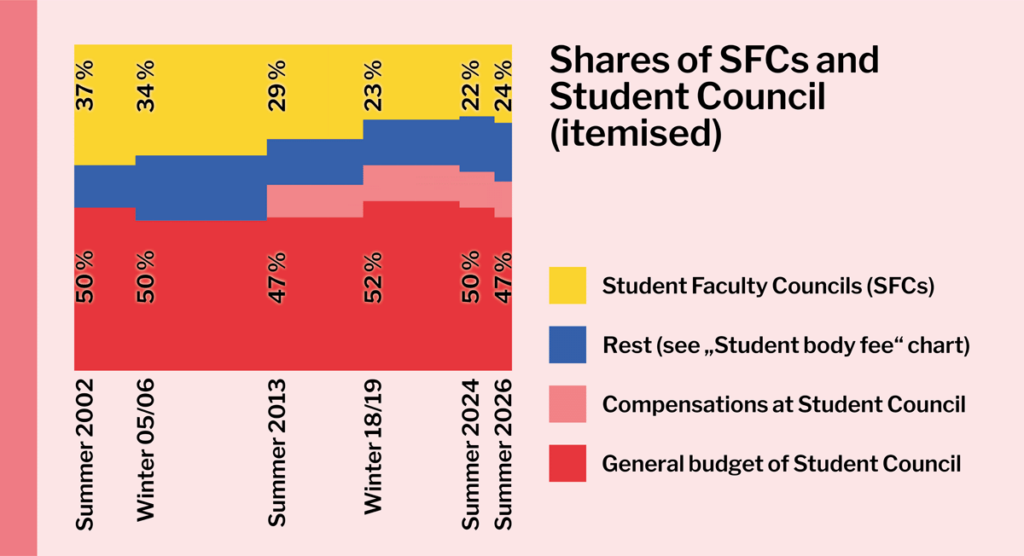
Most of the Student Faculty Councils who replied to our inquiry support a fee increase of the share that benefits them. A specifically demanded amount was brought forward by the representatives of the law students. In order to compensate for the inflation of the past seven years (which was circa 20%), they demand a SFC budget increase to a share of 25% of the student body’s membership fee. The SFC Medicine also demands inflationary adjustment, but additionally wants to revert back to the proportion of budgetary percentage shares of pre-2018 (circa 30%). If the student membership fee were to stay the same at €12.35, this would mean €3.70. At the end of June 2025, the Student Council decided to raise the fees to €16.50, thus increasing the SFC share to €3.90. They now receive a percentage share of 24% instead of the current 22%. The increased membership fee will take effect in the 2026 summer semester.
Approval rule proposed
To secure future inclusion of the SFCs, the representatives of medical and those of law students have pitched a corresponding regulation to be incorporated into the student council’s statute or articles of association. “One possibility of what this could look like would be the student faculty council conference becoming a compulsory subject to approval for any future student fee debates.”
“To ensure the sustainable, lasting work […] a budget increase is necessary. Without a structural increase, a threat of budget cuts elsewhere could be coming up soon.”
SFC Phil. Fac. I
“We would appreciate it if the Student Council would strive to find a constructive compromise for the good of all students.”
SFC Economics
“Don’t hide behind your self-constructed walls! Muster up the courage to leave your partisan interests behind! Remember who you — as the representatives of the student body — are obliged to! Talk with one another, find to each other and search for compromises!”
SFC Theology
On the Other Side
“University politics play a smaller role at the Heidecampus,” replies the SFC Agricultural and Nutritional Sciences. This is in line with observations coming from the Student Faculty Council Biochemistry, as it has come to their attention “that the Weinberg and Heide campuses are rarely acknowledged or considered and are almost neglected in comparison to the Steintor, Francke, and main campus.”
Whether large or small, the Student Faculty Councils take pride in their work.
Due to the splitting of the STEM faculties into smaller student faculties and SFCs, they are relatively small. Most only count between 300 and 800 members. This automatically means that their financial means — but certainly also their influence on university politics — are pretty restricted. Despite, or maybe exactly because of the point of criticism raised by the SFC Biochemistry, the Student Faculty Councils are important contributors, as “without the STEM SFCs, nothing would be happening at the Weinberg- and Heidecampus” — argue the representatives from the Math/Computer Science student faculty.
“We hope that the next Student Council shows more willingness to cooperate with all SFCs, and that the campuses in the northwest of Halle are being considered more than is currently the case.” — SFC Biochemistry
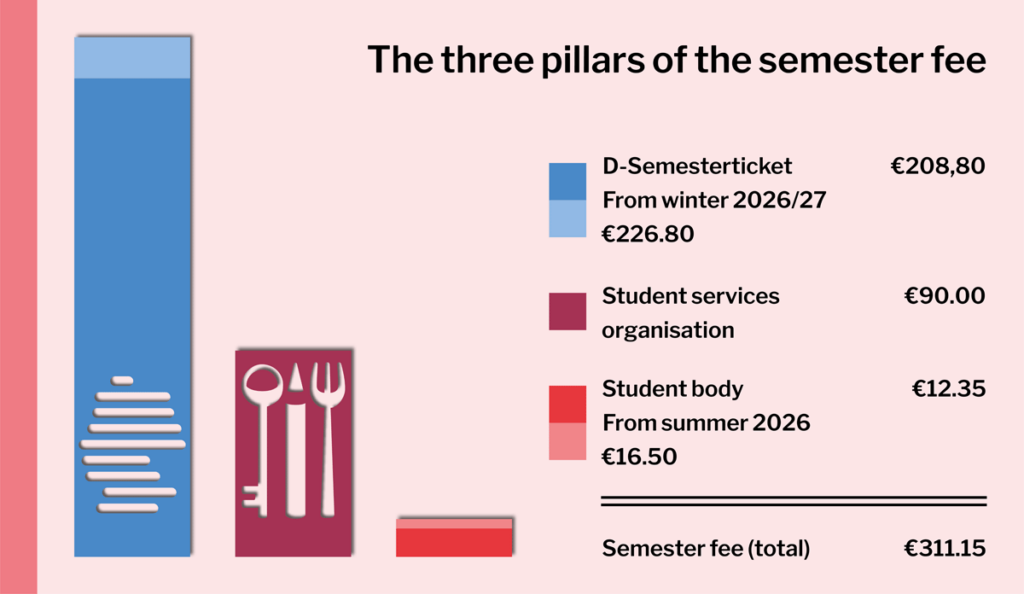
Importance of the SFCs
The work in the Student Faculty Councils is a voluntary commitment. That is the reality. “The SFCs are in our opinion the entity of university politics that is closest to the students,” say the biochemists. The law student faculty are in accordance: “If you ask the average student at our uni from which entity they benefit and hear from the most, they will in most cases answer with their corresponding Student Faculty Council or Institute Group.” Of course the SFCs are closer to their own Faculties than, say, the Student Council — and it should be that way. But it also has to be emphasized that only a part of the student body takes part in the offered projects of their Student Faculty Councils. Looking at it from that angle, one can also criticize the increase of student fees for all students. Despite that, Student Faculty Councils exist as a load-bearing pillar of the university community and play an important role for everyone who wants to actively contribute to it.
Proportional Overview of Student Body — 1 square equals 170 students

Text: Johannes Wingert
Translation: Ellen Helmecke
Charts: Konrad Dieterich
